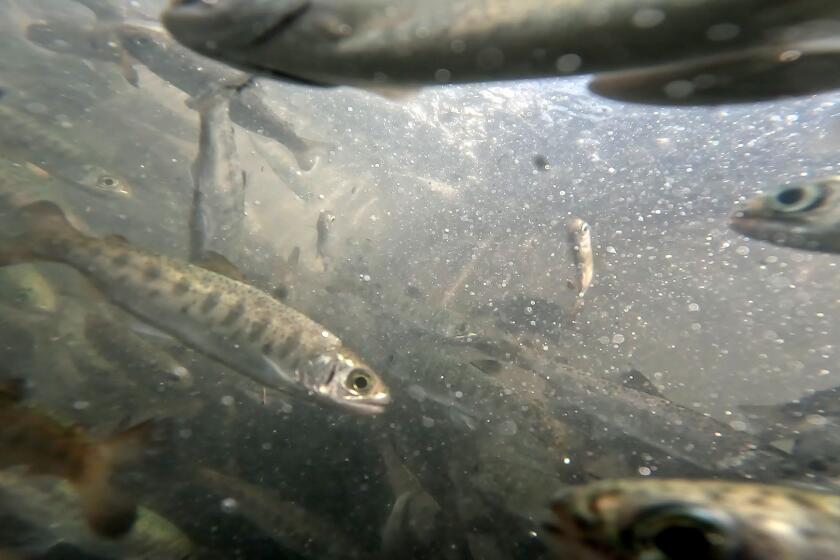Remote Nevada Road’s Status in Limbo
Any day now, Mother Nature will dump enough snow on South Canyon Road to effectively close it -- by anybody’s standards -- and the question of whether the remote backcountry road is technically open or legally closed will be moot again until spring.
In the meantime, just as it has for eight winters since a 1 1/2-mile stretch washed out in a 1995 flood, the legal status of the road remains in limbo. And the fractious dispute over property rights, government authority and a dwindling species of trout will continue to simmer in remote northeast Nevada.
The dispute now pits federal agencies against one another. The agencies disagree even among themselves on whether the road near the Idaho border is open or closed.
Environmentalists want the U.S. Forest Service to build a gate across the road in the Humboldt-Toiyabe National Forest near the town of Jarbidge. They want it locked until the agency determines if travel on the road poses a risk to the threatened bull trout.
“It really is an abdication of the Forest Service’s responsibility to protect public lands for them to continue treating the road as open,” said Michael Freeman, a lawyer in Boulder, Colo., who represents the Wilderness Society and Great Old Broads for Wilderness. Some Elko County property rights activists want the agency to recognize residents’ rights to travel the road and approve their plans to rebuild it.
“We opened the road three years ago,” said Grant Gerber, an Elko lawyer and one of the leaders of the “Shovel Brigade” that helped clear away boulders from the road at an Independence Day rally that drew hundreds to the tiny canyon.
“The Forest Service at the time was rumoring to everyone that we were doing it illegally. But if we had been doing it illegally, they would have arrested us,” Gerber said.
Even the experts at the two lead federal agencies are at odds over whether the road is open and to what extent, if any, motorized vehicles should be allowed on it.
Officials of the U.S. Fish and Wildlife Service say the road that winds along the Jarbidge River and runs to a primitive campground should be considered closed because it washed out in the flood and never was reopened legally.
The Forest Service for years treated the road as closed, rejecting county proposals to reopen it while sharing its sister agency’s view that motorized travel could accelerate stream-bank erosion and push the bull trout closer to extinction.
But more recently, Forest Service district Ranger Bill Van Bruggen suggested that the road was technically “open in disrepair.” And Humboldt-Toiyabe Forest Supervisor Bob Vaught has since declared that the road is neither open nor closed.
“From the Forest Service perspective, a road that is open is one that is safe, maintained for its use and available for public use. That is not the case here,” Vaught said.
“A road that is closed means there is a closure order on the road and anyone that would be on the road with a motorized vehicle could be issued a citation for violating the closure. That also is not the case here,” he said.
“I admit it’s a matter of semantics. But on these highly volatile issues, semantics can be important. It’s a very special circumstance and doesn’t fit our normal definitions.”
Vaught said the Forest Service discourages use of the road, “but people are not restricted from going up there.”
The Forest Service view has evolved since the agency entered a settlement agreement in 2001 in which it agreed that it would not challenge Elko County’s claim to a right of way on the road, Vaught said.
Environmentalists objected, saying the agency had no authority to waive its jurisdiction. In June 2003, a federal judge agreed, saying the agency had not followed the necessary procedures to grant a right of way.
Nevertheless, Vaught said he manages the road as though the agreement was in effect.
“I have read the judge’s report numerous times. I personally find it difficult to understand,” he said. “Until I get specific direction from the U.S. Attorney’s office, I’m continuing to follow the settlement agreement.”
The Fish and Wildlife Service is stopping short of endorsing a gate, but officials worry about the effect on the bull trout.
“The court put aside the settlement agreement, so in our opinion, that road is still not open to vehicular use,” said Randi Thompson, spokeswoman for the Fish and Wildlife Service in Reno.
For years, wildlife biologists for the Forest and Fish and Wildlife services have argued that the road should not be rebuilt because the potential harm to the bull trout would violate the Endangered Species Act.
“We have not changed our view,” Thompson said. “If anything, it is a worse situation now because we have a dozen crossings of the river now. But we cannot force them to close the road.”
Gerber said the condition of the rough road is improving as more people drive it.
“Each time somebody goes up there, they move a rock or two. It’s just gotten better over time, just like they did it back in the pioneer days,” Gerber said.
Sign up for The Wild
We’ll help you find the best places to hike, bike and run, as well as the perfect silent spots for meditation and yoga.
You may occasionally receive promotional content from the Los Angeles Times.



